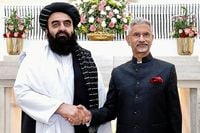In a move that could reshape South Asia’s diplomatic landscape, India has announced the reopening of its embassy in Kabul, upgrading its technical mission to full embassy status for the first time since the Taliban’s return to power in 2021. The decision, made public on October 10, 2025, during a high-profile visit by Afghanistan’s Acting Foreign Minister Amir Khan Muttaqi to New Delhi, signals a new chapter in India-Afghanistan relations—one marked by pragmatism, strategic calculation, and a careful balancing act in a volatile region.
Just a few years ago, the idea of India engaging directly with the Taliban would have seemed far-fetched. India had shuttered its Kabul embassy after the chaotic U.S. withdrawal and the Taliban’s swift takeover. For the past three years, New Delhi maintained only a small technical team focused on humanitarian aid, wary of the group’s history and its impact on Indian security interests. But as regional dynamics have shifted, so too has India’s approach.
According to AhlulBayt News Agency, the upgrade marks India’s first high-level engagement with the Taliban administration since 2021. External Affairs Minister Subrahmanyam Jaishankar, following talks with Muttaqi, reaffirmed India’s commitment to Afghanistan’s sovereignty, territorial integrity, and independence. "Closer cooperation between us contributes to your national development, as well as regional stability and resilience," Jaishankar said, adding, "To enhance that, I am pleased to announce today the upgrading of India's Technical Mission in Kabul to the status of Embassy of India."
Muttaqi, for his part, confirmed that Afghanistan would reciprocate by sending diplomats to New Delhi. "India will raise its technical mission to a diplomatic mission in Kabul, and our diplomats will also come here," he told reporters, emphasizing the goal of gradually returning to "normalcy." He described India as "a close friend," noting that New Delhi was the first to respond with aid after recent earthquakes in Afghanistan. The Afghan foreign minister called the embassy reopening "a new chapter" in bilateral ties, according to Reuters.
This visit was notable not only as the first by a Taliban official to India since 2021, but also for its timing. On the same day as the embassy announcement, Muttaqi used Indian soil to sharply condemn Pakistan for bombing civilian areas in Afghanistan’s Paktika province—a rare public rebuke of Islamabad by a Taliban leader. "Such issues cannot be resolved by strength. Countries with disputes should resolve them internally. Peace and prosperity are good for all," Muttaqi said, calling the airstrikes a "provocative act" and a violation of Afghan sovereignty, as reported by New Delhi-based outlets.
The backdrop to this diplomatic thaw is a rapidly evolving regional context. Historically, India and the Taliban have had a fraught relationship. During the 1990s, India supported the anti-Taliban Northern Alliance while Pakistan backed the Taliban regime. After 2001, India became one of Afghanistan’s largest regional donors, funding over 500 development projects across all 34 provinces. But the Taliban’s return to power upended India’s presence and leverage, forcing a retreat to humanitarian engagement and indirect contact.
Now, with relations between Kabul and Islamabad souring—especially after repeated Pakistani military operations targeting Tehreek-e-Taliban Pakistan (TTP) fighters allegedly sheltering in Afghanistan—India sees a strategic opening. Analysts quoted by Reuters and The Hindu suggest that New Delhi’s move is less about endorsing the Taliban and more about hedging its bets as Pakistan’s influence wanes. Harsh Pant, foreign policy head at India’s Observer Research Foundation, observed, "Engagement does not mean endorsement. There are many things that India is uncomfortable about (under Taliban rule)—minority rights, gender rights, and the human rights landscape in Afghanistan. But there is a pragmatism inherent in India’s engagement with the Taliban ... It certainly can be considered the beginning of a new phase in India-Afghanistan relations under the Taliban government, which have been one-directional so far."
India’s recalibrated strategy is multifaceted. On the civilian and developmental front, New Delhi announced a new slate of aid initiatives, including a Thalassemia Centre and 30-bed hospital in Bagrami, oncology and trauma centers in Kabul, maternity clinics, and donations of ambulances, medical equipment, and vaccines. Officials said future projects would focus on vocational training, scholarships, and support for women-led community ventures. The embassy upgrade restores India’s ability to directly oversee these programs and deepen engagement with Afghan society.
Security, however, remains the core concern. Both sides "unequivocally condemned all acts of terrorism emanating from regional countries" in their joint statement. Jaishankar stressed, "We have a common commitment towards growth and prosperity. However, these are endangered by the shared threat of cross-border terrorism that both our nations face. We must coordinate efforts to combat terrorism in all its forms and manifestations." Muttaqi pledged that Afghanistan "won’t allow any group to use the country against others," identifying Daesh (ISIS) as the main regional threat.
Indian intelligence assessments, cited by The Hindu, suggest that the Taliban leadership has shown a steady inclination to assert independence from Pakistan’s orbit, moving to restrict the influence of Pakistan-backed terror groups such as ISKP, Lashkar-e-Taiba, and Jaish-e-Mohammed. Discreet channels for information-sharing on terror threats are being explored, though no formal structures have been established yet. For India, the key is ensuring that Afghan soil is not used for anti-India activities—a lingering worry since the 1999 IC-814 hijacking.
On the economic front, Muttaqi invited Indian companies to invest in Afghanistan’s mining sector and called for the opening of the Attari–Wagah border for direct India–Afghanistan trade. "Pakistan and India should open the Wagah border to facilitate trade between Afghanistan and India. It will benefit the people of all three countries," he said. Currently, most India-Afghanistan trade is routed through Iran’s Chabahar port, but U.S. sanctions have complicated this channel, making direct overland routes through Pakistan theoretically attractive—though still politically fraught.
Despite these deepening ties, India has stopped short of formally recognizing the Taliban regime. The embassy’s reopening is a significant signal, but as officials and analysts repeatedly emphasized, it does not amount to official recognition. This nuanced stance allows India to engage pragmatically, build influence, and protect its interests without offering legitimacy to a government that remains under UN sanctions and is widely criticized for its human rights record, especially regarding women’s rights and minority protections.
India’s approach aligns with that of other regional and global powers. About a dozen countries, including China, Russia, Iran, Pakistan, and Turkey, maintain embassies in Kabul, but only Russia has formally recognized the Taliban administration. Most Western governments, as well as the United Nations and European Union, have opted for functional engagement without recognition—a policy India now mirrors.
As the embassy is gradually staffed and operational protocols are finalized in the coming weeks, India’s focus will remain on fostering stability, supporting development, and encouraging more inclusive governance in Afghanistan. Officials have hinted that as trust deepens, discussions on limited defense and security cooperation could be revived, though any such steps will be taken cautiously.
For now, India’s return to Kabul is both a response to shifting regional realities and a calculated bid to shape Afghanistan’s future from within rather than from the sidelines. The move underscores New Delhi’s desire to insulate itself from security risks, reassert influence in a region long dominated by Pakistan, and adapt to a rapidly changing geopolitical landscape. By reopening its embassy, India is signaling that it intends to be an active player in Afghanistan’s unfolding story—one that is far from over.



